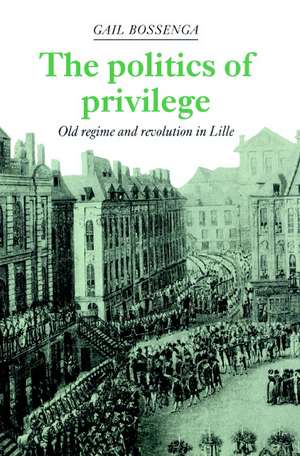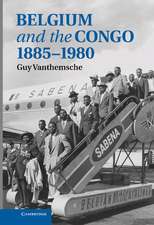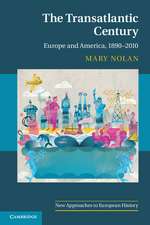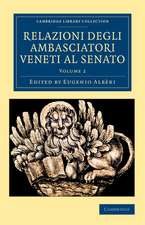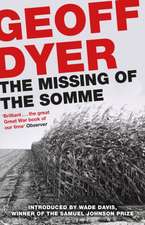The Politics of Privilege: Old Regime and Revolution in Lille
Autor Gail Bossengaen Limba Engleză Paperback – 8 mai 2002
| Toate formatele și edițiile | Preț | Express |
|---|---|---|
| Paperback (1) | 285.54 lei 6-8 săpt. | |
| Cambridge University Press – 8 mai 2002 | 285.54 lei 6-8 săpt. | |
| Hardback (1) | 693.36 lei 6-8 săpt. | |
| Cambridge University Press – 11 sep 1991 | 693.36 lei 6-8 săpt. |
Preț: 285.54 lei
Nou
Puncte Express: 428
Preț estimativ în valută:
54.65€ • 56.84$ • 45.80£
54.65€ • 56.84$ • 45.80£
Carte tipărită la comandă
Livrare economică 14-28 martie
Preluare comenzi: 021 569.72.76
Specificații
ISBN-13: 9780521893725
ISBN-10: 0521893720
Pagini: 276
Dimensiuni: 153 x 229 x 18 mm
Greutate: 0.4 kg
Ediția:Revised
Editura: Cambridge University Press
Colecția Cambridge University Press
Locul publicării:Cambridge, United Kingdom
ISBN-10: 0521893720
Pagini: 276
Dimensiuni: 153 x 229 x 18 mm
Greutate: 0.4 kg
Ediția:Revised
Editura: Cambridge University Press
Colecția Cambridge University Press
Locul publicării:Cambridge, United Kingdom
Cuprins
List of figures and tables; Preface; List of abbreviations; 1. Monarchy, privilege and revolution: the problem and setting; 2. State finance and local privileges; 3. Corps, bureaucracy and citizenship: the case of the Bureaux des Finances; 4. The excluded nobility and political representation; 5. A nation of equals: the demands of the Third Estate; 6. Uses of a regulated economy: the state against itself; 7. Corporate privilege and the bourgeoisie; 8. The abolition of the guilds; 9. The corporate heritage and the well-ordered state; 10. Conclusion; Notes; Bibliography; Index.
Recenzii
"Bossenga has made a major contribution to our understanding of the development of the modern state in a volume that combines detailed archival investigation with bold general claims. Her exploration of institutional relationships is profound and thought provoking..." Journal of Urban History
"This is an impressive, well-researched, and well-argued study that will force us, or allow us, to reevaluate our understanding of the collapse of corporate privilege during the revolution." American Historical Review
"Heavily based on archival sources, this fascinating and sphisticated study will interest all students of the Revolution." D.C. Baxter, Choice
"This is one of the most important books to appear for some years on the spirit (in Montesque's sense) of the Old Regime and how it collapsed into Revolution." William Doyle, Times Literary Supplement
"Gail Bossenga's penetrating examination of politics in Lille, France, offers the reader a unique insight into the eighteenth century world of urban privilege." History
"Bossenga greatly advances our understanding of the origins of the French Revolution by providing a sophisticated analysis of the relationship between the royal government and privileged corporate bodies in the town of Lille." Steven G. Reinhardt, Journal of Interdisciplinary History
"...the range of subjects in addition to the real depth of knowledge displayed makes her study immensely revelatory....Bossenga's impressive arguments give far more enphasis to fiscality; they force scholars to pay serious attention to these matters in any reconsideration of the revolution." Jack R. Censer, Journal of Modern History
"Bossenga illuminates the essential nature of the 1789 Revolution as a vital stage in the growth of the power of the state. Her basic thesis is that the revolution was essentially about institutional and not social change. The complexities of the relationship between the central government and the provinces are brilliantly dissected in seminal and minutely traced case studies of significant corporate bodies in Lille." Pamela M. Pilbeam, Journal of Urban History
"This is an impressive, well-researched, and well-argued study that will force us, or allow us, to reevaluate our understanding of the collapse of corporate privilege during the revolution." American Historical Review
"Heavily based on archival sources, this fascinating and sphisticated study will interest all students of the Revolution." D.C. Baxter, Choice
"This is one of the most important books to appear for some years on the spirit (in Montesque's sense) of the Old Regime and how it collapsed into Revolution." William Doyle, Times Literary Supplement
"Gail Bossenga's penetrating examination of politics in Lille, France, offers the reader a unique insight into the eighteenth century world of urban privilege." History
"Bossenga greatly advances our understanding of the origins of the French Revolution by providing a sophisticated analysis of the relationship between the royal government and privileged corporate bodies in the town of Lille." Steven G. Reinhardt, Journal of Interdisciplinary History
"...the range of subjects in addition to the real depth of knowledge displayed makes her study immensely revelatory....Bossenga's impressive arguments give far more enphasis to fiscality; they force scholars to pay serious attention to these matters in any reconsideration of the revolution." Jack R. Censer, Journal of Modern History
"Bossenga illuminates the essential nature of the 1789 Revolution as a vital stage in the growth of the power of the state. Her basic thesis is that the revolution was essentially about institutional and not social change. The complexities of the relationship between the central government and the provinces are brilliantly dissected in seminal and minutely traced case studies of significant corporate bodies in Lille." Pamela M. Pilbeam, Journal of Urban History
Descriere
The first study to examine in detail the political and fiscal origins of the French Revolution by sustained archival research.
